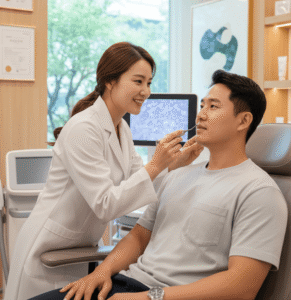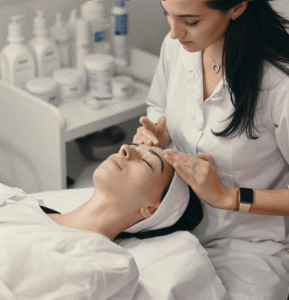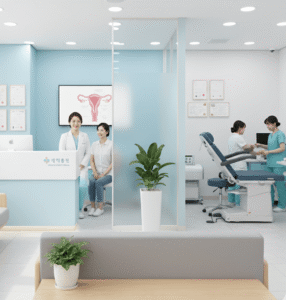Overview
Absent periods, medically referred to as secondary amenorrhoea, occur when menstruation stops for three or more months in women who previously had regular cycles. It can be caused by hormonal imbalances, lifestyle factors, stress, or underlying medical conditions. While occasional skipped periods are normal, persistent absence of menstruation may indicate reproductive or systemic health issues. In Korea, hospitals and specialized gynecology clinics provide advanced evaluation, treatment, and monitoring to restore menstrual cycles, improve fertility, and ensure overall reproductive health.
Key Facts
▶ Prevalence: Secondary amenorrhoea affects a significant number of women worldwide, especially in adolescence and during reproductive years.
▶ Duration: Absence of periods for three months or longer is considered clinically significant.
▶ Symptoms: Missed menstruation, hot flashes, vaginal dryness, fatigue, and sometimes infertility.
▶ Common Causes: Hormonal disorders, stress, excessive exercise, low body weight, and chronic illnesses.
▶ Treatment Options in Korea: Includes hormonal therapy, lifestyle interventions, nutritional support, fertility treatments, and surgical procedures if needed.
What are Absent Periods?
Absent periods occur when menstruation ceases after previously regular cycles. It is a symptom rather than a disease and often signals an underlying health issue.
▶ Secondary Amenorrhoea: Missed periods for three or more months in women who previously menstruated regularly.
▶ Primary Amenorrhoea (for context): Never having had a period by age 15–16.
Note: Persistent absence of menstruation can affect fertility, bone health, and hormonal balance.
What Symptoms Are Related to Absent Periods?
▶ No Menstrual Bleeding: The most noticeable and defining symptom.
▶ Hot Flashes and Night Sweats: Often associated with hormonal fluctuations.
▶ Vaginal Dryness: Low estrogen levels may cause discomfort.
▶ Infertility: Difficulty conceiving due to lack of ovulation.
▶ Mood Changes: Irritability, depression, or anxiety linked to hormonal imbalance.
▶ Weight Fluctuations: Rapid weight gain or loss may contribute to absent periods.
▶ Hair Growth or Hair Loss: Hormonal disorders like PCOS can lead to changes in hair patterns.
What Causes / Possible Causes
Absent periods can arise from a variety of hormonal, structural, and lifestyle factors:
▶ Polycystic Ovary Syndrome (PCOS): Causes irregular or absent ovulation due to androgen excess.
▶ Thyroid Disorders: Hypothyroidism or hyperthyroidism can disrupt menstrual cycles.
▶ Excessive Exercise or Low Body Weight: Reduces estrogen and affects ovulation.
▶ Stress or Psychological Factors: Emotional stress affects the hypothalamic-pituitary-ovarian axis.
▶ Premature Ovarian Insufficiency: Early loss of ovarian function leading to menstrual cessation.
▶ Medications: Hormonal contraceptives, chemotherapy, or antipsychotics can interfere with cycles.
▶ Structural Abnormalities: Uterine or ovarian malformations may prevent menstruation.
▶ Chronic Illnesses: Diabetes, celiac disease, or autoimmune disorders may contribute.
When Should I See My Doctor?
▶ Persistent Absence: No period for three or more months.
▶ Severe Symptoms: Hot flashes, mood changes, or vaginal dryness impacting daily life.
▶ Infertility Concerns: Difficulty conceiving or planning pregnancy.
▶ Underlying Health Issues: Suspected hormonal, structural, or chronic medical conditions.
▶ Medication-Related Concerns: Changes in periods after starting new medications.
Tip: Early evaluation prevents complications such as infertility, osteoporosis, and long-term hormonal imbalance.
Care and Treatment
Management focuses on addressing the underlying cause and restoring normal menstrual function:
▶ Lifestyle Adjustments: Balanced diet, healthy weight management, and stress reduction.
▶ Exercise Moderation: Avoiding excessive physical activity that may disrupt cycles.
▶ Hormonal Therapy: Estrogen-progestin therapy to regulate periods and support fertility.
▶ Nutritional Support: Adequate intake of vitamins, minerals, and calories essential for reproductive health.
▶ Psychological Support: Counseling for stress, anxiety, or eating disorders contributing to absent periods.
Treatment Options in Korea
Medical Treatments:
▶ Hormonal Therapy: Personalized treatments to restore ovulation and menstruation.
▶ Medications for PCOS or Thyroid Disorders: Drugs to manage endocrine dysfunction and cycle irregularities.
▶ Fertility Medications: Stimulate ovulation in women desiring pregnancy.
Procedures and Surgeries:
▶ Structural Corrections: Surgery for congenital uterine or ovarian anomalies.
▶ Assisted Reproductive Technologies (ART): IVF or other fertility procedures if conception is desired.
Rehabilitation & Support:
▶ Regular Monitoring: Hormone tests, ultrasound evaluations, and follow-ups.
▶ Counseling Services: Emotional support for stress-related or lifestyle-linked absent periods.
▶ Specialist Clinics: Korean gynecology centers provide comprehensive care combining diagnostics, treatment, and fertility management.
Outcome: With timely diagnosis and appropriate treatment in Korea, most women can restore regular menstrual cycles, improve fertility, and maintain overall reproductive health.













